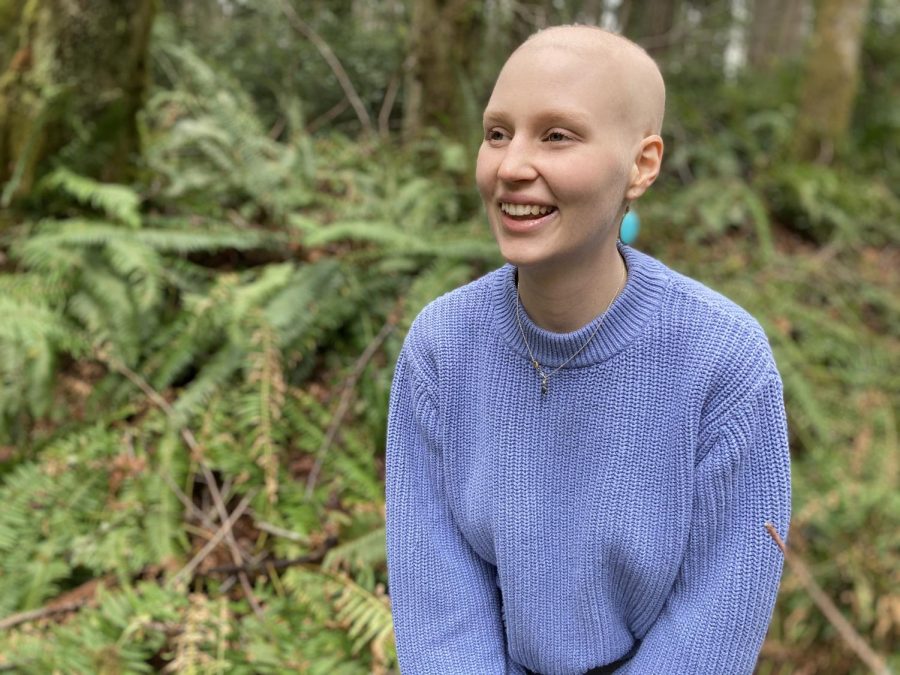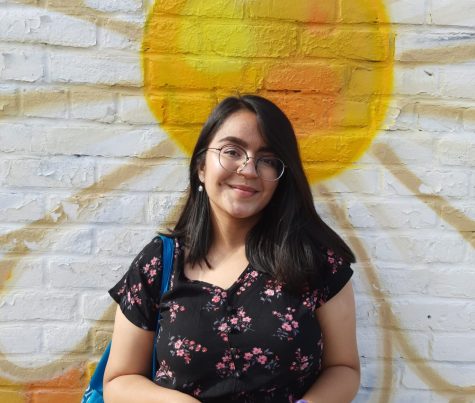In the Works: Tess Mueller ’21 on how hurt fades and honoring vulnerability in her honors thesis
April 15, 2021
Tess Mueller ’21 is pursuing a religious studies major at Macalester College. Mueller’s senior honors thesis explores her experience of cancer care, medicine as a form of religious practice and the hurt that persists and fades within individuals and their communities. Mueller was diagnosed with leukemia in December 2019 and underwent a bone marrow transplant in April 2020. She relapsed in November 2020 and is scheduled for her second transplant on April 16, 2021. She is an advocate for greater acceptance of personal reflection as academic work in various fields. The following is part of an interview The Mac Weekly conducted with Mueller. The transcript has been slightly edited and revised for clarity.
The Mac Weekly (TMW): What is the key focus of your work?
Tess Mueller (TM): So, my piece of work is not really “academic.” It’s a collection of prose, poetry and journal entries that I wrote over the past year and a half going to treatment for leukemia. It focuses on both the painful side of my experience as well as how important community has been in my family to the process of healing. The process of writing itself has been really healing for me. So, the main themes of it really are community and hurt and how community comes together to bridge that hurt.
TMW: Can you summarize any major trends you have found within your research in one minute?
TM: I didn’t really do a lot of research. What I did is I read other people’s cancer diaries. I read Audre Lorde’s cancer journals, and I read a book by Eve Kosofsky Sedgwick and then also another woman, Kate Bowler ’02, and I pulled pieces from their writing that connected to my own experience. It was really interesting to be able to see similarities and also differences between the experience of going through cancer treatment between all these different women. A lot of it is just very personal, not research-based.
TMW: What continues to be the most interesting discovery or realization that you’ve had so far with your work?
TM: The most interesting and wonderful piece of it for me was giving it to people to read. I’ve given what I wrote to a lot of friends and loved ones and family members to read and it’s been a really wonderful way of expressing things that I don’t necessarily feel comfortable expressing through conversation because it’s harder, it’s painful or it’s just challenging to talk about difficult situations. Hearing people’s responses to my writing and getting feedback and knowing that I’m having this conversation on a different level with people has been really wonderful and really beautiful. I’ve really loved that part of it.
TMW: What are some main motivations for you to engage in this work?
TM: I originally began my honors project with more of a religious studies focus on cancer care and how cancer care and medicine, in fact, function as a religious practice for a lot of people. But as I started writing and doing research, I just wasn’t removed enough from this because I was still going through treatment. I am so entrenched in it. I wasn’t able to step back and do something that was more theoretical. I had to do something that was more personal. So, it was like a breath of fresh air when I realized that I can do this personal piece and still have it be an academic thesis for my religious studies honors thesis without it being something that’s theoretical per se. I got a lot of support from my advisors and the religious studies department and they really supported me in doing this project. I appreciated that.
TMW: Where do you see this work in the next five years?
TM: Part of it is just for me personally. I’m glad to have a written record of where I am today and this snapshot of this time in my life that I have gotten to record and write down. I hope to grow it. I hope to keep writing not in such an official sense, but to keep adding to it in different ways because it has been a really wonderful process for me. I hope that I won’t be still going through cancer treatment five years from now. But I think it will be a great way to look back on this moment in my life and how it has changed me in a lot of different ways and changed my family and my community.
TMW: Did you reach a low in the duration of your engagement? How did you address it?
TM: Part of it for me was learning how to write only for myself and not for other people because it is such a personal piece. So, the times when I felt the most discouraged was when I changed my perspective to write for other people and then I wasn’t really happy with what I was coming up with until I took a step back and realized that I’m writing this for me. That’s when I felt like I came up with things that were the most honest and most clear and just said the most that I needed them to say.
TMW: If there is one thing you knew before getting started, what would it be?
TM: To not be afraid of it because I went in unsure of myself and my ability to write about this. But by the end it was something that was really cathartic and healing. In the beginning, I was really nervous about my ability to tell a story that was so personal to me. But as I went through it, I was like, oh no, this is really really nice to do. That’s so hopeful.
TMW: What are some avenues for future research work in this field?
TM: I’ve been thinking about possibly getting it published. That would be exciting. I’m going through a transplant right now so I’m really busy medically, but I would love to be able to hold this work in a booklet. That would be really cool. I trust that academic work can be more personal and it’s okay. One way that academia can grow is by allowing things to be more personal and I just want to keep that in mind as I go into other academic fields — keep in mind that it’s a personal experience with whatever you’re doing. That’s something that I would like to see.
TMW: How do you see hurt differently now? If there is something that can be extrapolated for anyone to understand about hurt, what is one lesson about hurt that you’d want people to know?
TM: It depends on the person. I feel really lucky because when I look back on hurtful and painful memories from this past year and a half of treatment, they sort of fade away. The title of my piece is “How Hurt Fades.” Those memories become just memories. I don’t feel that pain that I was feeling when I was going through them and I feel really lucky about that.
I know that there are some people who have a lot of trauma associated with going through medical treatment. It’s a deeply traumatic experience and in some ways, it has been for me, but mostly I’m reminded of all of the wonderful memories that I have of people visiting me in my hospital room or getting to go on hikes with my family. Things that interspersed these painful memories. Those are the things that I remember the most clearly in the things that I can feel most clearly versus the hurt and the pain. I can’t feel hurt anymore and I appreciate that I can’t feel it anymore. But it’s very different for a lot of people and that’s something that I have to be aware of. It’s been about healing a lot.
TMW: If you could manifest one vision or wish about your work, what would it be?
TM: I relapsed last year. So, this is the second transplant that I’m getting. I want to manifest that it’s all going to work and that’s my big, you know, saying. I’ve learned this year, both through cancer and the COVID-19 pandemic, how important all of our relationships are. So, I just want to manifest that they keep being this important and that I keep putting a premium on them because it’s such a wonderful part of life. So, my concrete wish is that I do not want to relapse. I want this transplant to work. Also, keeping relationships as strong as I feel like I’ve been able to build them this year.














